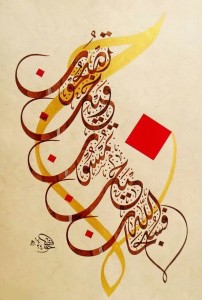 In the Sahih of Imam Bukhari there is a Hadith where the Prophet (saws) states, ‘Of all the people who are alive upon the earth on this day, none will be living in a hundred years time’.
In the Sahih of Imam Bukhari there is a Hadith where the Prophet (saws) states, ‘Of all the people who are alive upon the earth on this day, none will be living in a hundred years time’.
It could be this hadith is a generalisation and referring to all the people who had not been given a gift from Allah, which is all people on earth except for Isa (as), Idris (as), Ilyas (as) and al Khidr, this phrasing is still an acceptable form of speech in Arabic, of which there are many examples relating to everyday matters.
It could also be possible al Khidr was not on the surface of the earth or in a place other than earth at this time, like Isa (as) is alive in Jannah (Heaven), the prophet (saws) has visited other worlds where he met some of Allah’s other creations.
Ibn ‘Abbas said in regards to His (Exalted is He) statement “and of the earth the like thereof”: “Seven earths: In every earth is a prophet like your Prophet, an Adam like your Adam, a Nuh like your Nuh, an Ibrahim like your Ibrahim and an ‘Isa like your ‘Isa.”(“like your Adam” relates to their role in life among their people) (Sahih, the Mustadrak of Hafiz Abu ‘Abdullah al-Hakim).
Ibn ‘Abbas said: “In every earth is the like of Ibrahim.” This hadith is
The second objection is that the Prophet (May Allah bless him and grant him peace) supplicated (du’a) upon the occasion of the battle of Badr. “There are three hundred and thirteen people with me. If we do not triumph then no one will be left to worship you Oh Allah.” this is referring to an eventuality of matters, that no other Ummah would be raised up to worship Allah and not a specific prediction
The other explanation of the du’a is it means of the people present at this battle ‘There will be none to worship you with victory.’ because there where Muslims still in Madinah, Abysinnia and Makkah who would have continued to worship Allah.
The Third objection is the verse “AND [remind those who deny thee, O Prophet, that] never have We granted life everlasting to any mortal before thee: but do they, perchance, hope that although thou must die, they will live forever? Every human being is bound to taste death; and We test you [all] through the bad and the good [things of life] by way of trial: and unto Us you all must return.” (21.34-35) This is in relation to eternal life with out Death, Isa (as) has extended life but will die at the end of time.

